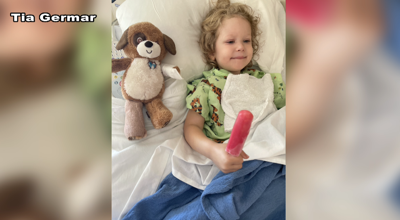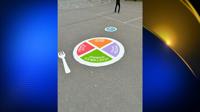A rattlesnake bit 3-year-old Alice Germar’s foot Thursday night at 10 p.m. while she was helping her dad take out the trash barefoot. Swelling is down and she’s in good spirits after receiving treatment.
CHICO, Calif. - 3-year-old Chico girl Alice Germar is recovering at the UC Davis Medical center after a rattlesnake bit her foot Thursday night at 10 p.m.
The snake bit her in the driveway of her home while she was helping her dad take out trash barefoot. She first got treatment at Enloe Medical Center then was flown to UC Davis.
Alice's mom, Tia Germar says they encounter at least one rattlesnake a year where they live, but this is the first time one of them has been bitten.

“Yeah, it’s just these weird emotions of needing to stay strong for my 7-year-old and for Alice," said Tia Germar. "It’s just a weird mixture of all kinds of emotions and you really want to just cry, but you know you can’t. We’re just really lucky and feel thankful that she’s doing so well.”
Tia says her daughter received anti-venin at the hospital and her swelling went down. She says they’ll do a better job of always wearing shoes outside and paying more attention to their surroundings.
Germar is in good spirits now and Tia even says her daughter has already gone through 4 popsicles in the hospital.
Enloe Medical Center tells Action News Now that younger patients are sometimes transferred to UC Davis, just for pediatric care, but Enloe has all of the necessary resources to treat venomous snake bites.
Dr. Nicklaus Brandehoff of Enloe Medical Center says there are about 9,000 rattlesnake bites in U.S. every year, but only 3-5 deaths.
Several snake experts tell Action News Now rattlesnakes don't want to bite you, but will if they're scared or feel trapped.
You also might not hear them as well as you think you would. Tyler Young from Placer Snake Removal says you should check your surroundings and not just rely on hearing their rattle.
He says a rattlesnake will rattle usually after it’s poked or messed with. Now when it comes to getting bitten by one, he says the best thing to do is nothing, just control your breathing and call 9-1-1.
“If you do get bit, you don’t need to tie off the limb, don’t ice it and don’t try to suck out the venom it’s a whole waste of time," said Young who owns Placer Snake Removal. "If you do try to tie up the limb, there is a chance you might cause more permanent damage to the affected limb if you kind of concentrate the venom to a smaller area. Ideally, if you let the venom kind of do its thing throughout the whole body, it kind of dilutes it to an extent."
Expert snake wranglers and doctors tell Action News Now that baby rattlesnakes are not more dangerous or venomous than larger ones. They say that's just a myth.
“A baby rattlesnake has two tic tac size venom glands that are able to produce venom, so two tic tacs worth of venom, which an adult rattlesnake has about a pair of M&Ms worth of venom," said Dr. Nicklaus Brandehoff of Enloe Medical Center.
Dr. Brandehoff says even if an adult rattlesnake excretes only a quarter of its venom, it would still be more than what a baby rattlesnake can inject.
The experts tell Action News Now you should get treatment within an hour after you get bitten.
Enloe Medical Center has the antivenin and pain medication to treat most bites, but it all depends on where the snake bites you, the size of the snake and how big you are.
Even though expert snake wranglers and doctors say baby rattlesnakes are not more dangerous or venomous than larger ones, they suggest to still go to the hospital immediately, no matter what.
They also suggest not walking or moving around too much to help lower your heart rate while waiting for medical attention.
“We currently have ANAVIP in stock, which is one of the two antivenom that were FDA approved to treat rattlesnake bites in the United States," said Dr. Brandehoff. "We certainly have enough, we have more than enough vials of antivenom to treat a rattlesnake venomation.”
Dr. Brandehoff says not all rattlesnake bites inject venom, but most do. He says there are about 9,000 rattlesnake bites in the U.S per year and only 3-5 deaths from them.
The experts also suggest to not go out barefoot or in sandals in most canyon areas throughout Chico. They say just take the extra minute to put on shoes or boots since ankles and feet bites are common.














